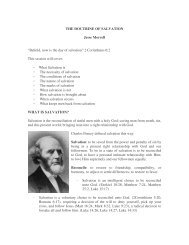Does_God_Take_Away_Free_Will_Jesse_Morrell 2.pdf - PinPoint ...
Does_God_Take_Away_Free_Will_Jesse_Morrell 2.pdf - PinPoint ...
Does_God_Take_Away_Free_Will_Jesse_Morrell 2.pdf - PinPoint ...
Create successful ePaper yourself
Turn your PDF publications into a flip-book with our unique Google optimized e-Paper software.
law. If that be not maintained, but the law fall into contempt, the<br />
contempt will fall equally on the legislator himself; his authority<br />
will be despised and his government weakened. And as the<br />
contempt shall increase, which may be expected to increase, in<br />
proportion to the neglect of executing the law, the divine<br />
government will approach nearer and nearer dissolution, till at<br />
length it will be totally annihilated.” Jonathon Edwards Jr. (The<br />
Necessity of the Atonement, p. 2-3)<br />
“An atonement is necessary because there is nothing else<br />
that will remove the difficulties in the way of pardon, or because<br />
there is no other way by which it can be consistent for <strong>God</strong> to<br />
forgive an offender and to restore him to favour.” Albert Barnes<br />
(The Atonement, Published by Bethany Fellowship, p. 157)<br />
“The atonement is a governmental expedient to sustain law<br />
without the execution of its penalty to the sinner.” Charles G.<br />
Finney (The Oberlin Evangelist; July 30, 1856; On the Atonement,<br />
p. 2)<br />
"The atonement of Christ was necessary to demonstrate His<br />
righteousness in the free pardon of repentant sinners. The word<br />
demonstrate signifies a manifestation, a public declaration, a<br />
showing forth or a proof of <strong>God</strong>'s righteous method in the<br />
administration of forgiveness." Gordon C. Olson (The Truth Shall<br />
Make You <strong>Free</strong>, Published by Bible Research Corp, p. 94)<br />
"The sacrifice made on Calvary is to be understood as<br />
<strong>God</strong>'s offering to public justice--<strong>God</strong> himself giving up his Son to<br />
death, and this Son pouring forth his life's blood in expiation for<br />
sin--thus throwing open the folding gates of mercy to a sinning,<br />
lost race. This must be regarded as manifesting his love to sinners.<br />
This is <strong>God</strong>'s ransom provided for them." Charles G. Finney (The<br />
Oberlin Evangelist; July 30, 1856; On the Atonement, p. 5)<br />
"Sin deserves eternal penalty, and the penalty may not be<br />
remitted, except on rectorally sufficient ground." John Miley (The<br />
Governmental Theory of the Atonement, p. 6)<br />
THE ATONEMENT SUBSTITUES THE PUNISHMENT<br />
“The very idea of atonement is something done, which, to<br />
the purpose of supporting the authority of the law, the dignity and<br />
consistency of divine government and conduct, is fully equivalent<br />
to the curse of the law, and on the ground of which, the sinner may<br />
be saved from that curse…a less degree or duration of suffering<br />
endured by Christ the Son of <strong>God</strong>, may, on account of the infinite<br />
dignity and glory of his person, be an equivalent to the curse of the<br />
law endured by the sinner.” Jonathon Edwards Jr. (The Necessity<br />
of the Atonement, p. 7)<br />
“His sufferings were in the place of the penalty, not the<br />
penalty itself. They were a substitution for the penalty, and were,<br />
therefore, strictly and properly vicarious, and were not the identical<br />
sufferings which the sinner would himself have endured. There are<br />
some things in the penalty of the Law, which the Lord Jesus did<br />
not endure, and which a substitute or a vicarious victim could not<br />
endure. Remorse of conscience is a part of the inflicted penalty of<br />
the Law, and will be a vital part of the sufferings of the sinner in<br />
hell - but the Lord Jesus did not endure that. Eternity of sufferings<br />
is an essential part of the penalty of the Law - but the Lord Jesus<br />
did not suffer forever. Thus, there are numerous sorrows connected<br />
with the consciousness of personal guilt, which the Lord Jesus did<br />
not and cannot endure.” Albert Barnes (Commentary on Galatians<br />
3:13)<br />
“He did not endure eternal death….eternal death was the<br />
penalty of the law...No man can possibly hold that the Redeemer<br />
endured eternal sorrow; and no man, therefore, who believes that<br />
the penalty of the law is eternal death, can consistently maintain<br />
that he endured the literal penalty of the law.” Albert Barnes (The<br />
Atonement, Published by Bethany Fellowship, p. 236-237)<br />
“The atonement is something substituted in the place of the<br />
penalty of the law, which will answer the same ends as the<br />
punishment of the offender himself would. It is instead of<br />
punishment. It is something which will make it proper for the<br />
lawgiver to suspend or remit the literal execution of the penalty of<br />
the law, because the object or end of that penalty has been secured,<br />
or because something has been substituted for that which will


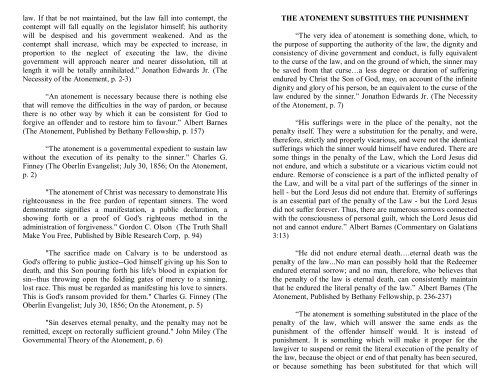

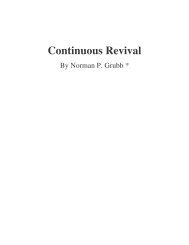
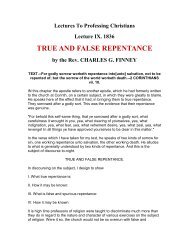
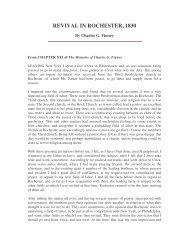

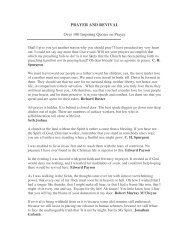
![[PDF] SIX DAYS OR MILLIONS OF YEARS? - Answers in Genesis](https://img.yumpu.com/34887318/1/190x245/pdf-six-days-or-millions-of-years-answers-in-genesis.jpg?quality=85)




